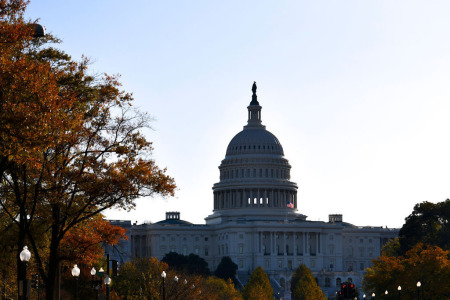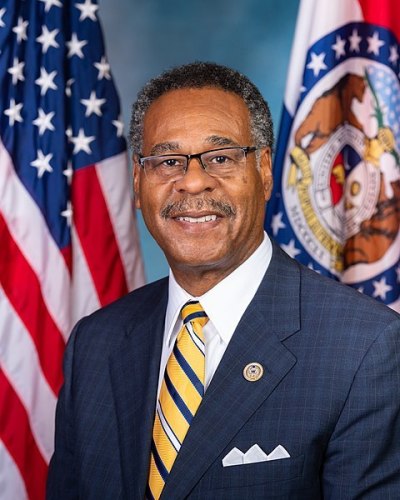Congressman says 'awoman' ending of opening prayer was 'light-hearted pun'

The Democratic congressman who opened up the 117th Congress with a prayer that ended in “amen and awoman” has since said that awoman was meant to be a “light-hearted pun” rather than an ecclesiastical statement.
After Sunday’s “awoman” prayer provoked condemnation from many conservatives and Christians on social media, Rep. Emanuel Cleaver, D-Mo., responded to critics by releasing a statement condemning those who he said “misinterpreted and misconstrued” his prayer.
“I am deeply disappointed that my prayer has been misinterpreted and misconstrued by some to fit a narrative that stokes resentment and greater division among portions of our population,” the 76-year-old lawmaker said in a statement shared with The Kansas City Star on Monday.
“I believe prayers to be a personal conversation between El Shaddai and the invocator. With this conversation, in the presence of the 117th House of Representatives, I concluded with a light-hearted pun in recognition of the record number of women who will be representing the American people in Congress during this term as well as in recognition of the first female Chaplain of the House of Representatives whose service commenced this week.”

Cleaver, the former mayor of Kansas City who for decades served as pastor of Kansas City’s St. James United Methodist Church, continued by saying that he finds these “historic occasions to be blessings from God for which I am grateful.”
“Rather than reflecting on my faithful requests for community healing and reversion from our increasingly tribal tendencies, it appears that some have latched on to the final word of this conversation in an attempt to twist my message to God and demean me personally,” Cleaver said. “In doing so, they have proven one point of my greater message — that we are all ‘soiled by selfishness, perverted by prejudice and inveigled by ideology.’”
Among those who were critical of Cleaver’s awoman comment include Rep. Matt Gaetz, R-Fla., who joked in a tweet: “Don’t they know that gender isn’t binary??? What about the other 42 genders??"
Many commenters online, including incoming Rep. Lauren Boebert, R-Colo., noted that the word amen is not a gendered term.
"I guess the virtue signaling Democrats didn’t check the Hebrew etymology of the word ‘Amen’ to realize it has NOTHING to do with gender,” Boebert tweeted. “But don’t let facts get in the way of a good virtue signal. Also, didn’t those words just get banned?"
Boebert's reference was to the introduced code of conduct for the 117th Congress, which includes changing gender-specific terms and pronouns in the House rules to be gender-neutral to "honor all gender identities.”
On Monday, former Democrat Rep. Tulsi Gabbard of Hawaii, a 2020 presidential candidate, blasted the gender-neutral language in the new House rules during an interview with Fox News.
"It's the height of hypocrisy for people who claim to be the champions of rights for women to deny the very biological existence of women," Gabbard said. "Their first act as this new Congress could have been to make sure elderly Americans are able to get the COVID vaccine now alongside front-line healthcare workers. Instead of doing something that could actually help save people's lives, they are choosing instead to say, 'You can't say, mother or father.'"
Although Cleaver issued his response to the criticisms of his prayer on Monday, he is still being criticized.
On Wednesday, an op-ed by Katrina Trinko, editor-in-chief at the conservative Daily Signal, was published in USA Today.
“Yet with Cleaver’s wordplay coming amid a House Democrat push to eliminate gendered terms like mother and father from chamber rules in the interest of equality, it’s hard not to see the vocabulary choice as somewhat pointed,” Trinko wrote. “Furthermore, the Missouri Democrat could have offered gratitude for the new women in his words without jarringly twisting a prayer ending into a pun.”
“But even taking Cleaver at his word, his actions still come at a time of a troubling attitude among our political elites toward religion,” she continued. “Too often our modern world sees religion as needing to conform to us, rather than for us to conform to religion.”
Trinko argues that Cleaver is “hardly the only example of this kind of thinking.”
“Just last month, Virginia Gov. Ralph Northam told residents they shouldn’t want to celebrate the birth of Christ in a church. ‘For me, God is wherever you are,’ the Democrat said. ‘You don’t have to sit in the church pew for God to hear your prayers,’” Trinko recalled.
“Can we imagine lawmakers doing this for a non-Western faith or cultural tradition? Would a lawmaker say he believes Mecca is wherever you want it to be, right there in your heart? Would a politician decree she thinks the Chinese New Year could just as well be celebrated in July?”
While Cleaver contends that his prayer included “faithful requests for community healing and reversion from our increasingly tribal tendencies,” Trinko argues that “healing and reversion from tribalism depend on mutual respect, not flippant approaches to faith.”





















